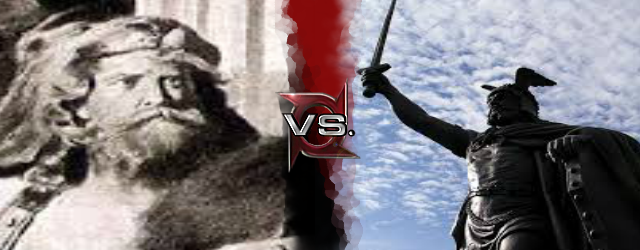

It made the Romans respect and fear Germania and they would eventually form defensive borders rather than risk further incursions, thanks to the traitorous Arminius. Retribution was swift and harsh as Roman armies stomped through Germany for years after, and Arminius was eventually assassinated, but the defeat still lingered. Two of the legion numbers were never used again. Though only reported by one source, Augustus is said to have hit his head against the wall repeatedly shouting “Varus, give me back my Legions”. This disaster happened near the end of Augustus’ great reign and caused the aged emperor great anguish. The reaction at Rome was one of absolute devastation, there had not been a defeat of this scale in a generation. The ensuing battle of Teutoburg Forest was one of Rome’s greatest military disasters, with Varus killed and nearly every Roman killed or enslaved. Vercingetorix throws down his arms at the feet of Julius Caesar.

Arminius gave Varus a tale of a rebellion deep in the forest of Germany and led the Romans through thick forest where tens of thousands of Germans from multiple tribes banded together to ambush the Romans. Arminius had been sent to Rome at a young age, gained a proper military education and rose to the status of equestrian before accompanying a Roman army into his native Germania.ĭespite his citizenship, Arminius was loyal to Germany and secretly set a massive trap for the Roman general Varus and his three Roman legions. Roman auxiliary forces were a common and vital part of the legion since its formation, conquered or otherwise subdued or allied areas would send men to serve and some officers could even be granted citizenship as was the case with Arminius. One German, Arminius had become a Roman citizen and an officer of the legion’s auxiliary forces. The land was on the other side of the formidable Alps from Italy, but still close enough to warrant conquest for its lands and Roman safety. Building on Caesar’s Gallic conquest, many Roman armies began venturing into Germania. Augustus was by all accounts a great emperor for Rome he expanded the borders and smoothed out where the Romans had influence. Author: Myrabella – CC BY-SA 4.0 ArminiusĪrminius gave the first Roman Emperor, Octavian Augustus, quite the headache late into his reign. Vercingétorix Memorial in Alesia, near the village of Alise-Sainte-Reine, France. Not only was he a major thorn in Caesar’s side, but the unification of Gaul incited deep-seeded Roman fears of Gallic invasions, a very good reason to hate Vercingetorix with a passion. Caesar pandered to the Roman masses and so the general public was aware of Vercingetorix’s exploits and cheered when he was later executed as part of Caesar’s Triumph. Caesar was certainly frustrated by the speed at which so vast a rebellion grew and the defeat at Gergovia must have stung. He was perhaps the most hated man of the entire Gallic campaign. The city ultimately fell after the Gauls failed to break the siege and Vercingetorix surrendered. The battle of Alesia was fiercely fought, and Caesar had to enter the fray himself to inspire his men to turn the tide. Numbers vary, but as many as 100,000 or more men from all over Gaul were on their way to crush Caesar’s army between them and the Besieged army sallying out.Īt the outset, this battle threatened to undo all of Caesar’s campaigns and destroy him and his army all at once. Caesar had about as many troops as the besieged forces and decided on two rings of fortification, one towards the city and one facing outwards to protect against the relief forces, and there sure were some on the way.

Soon Caesar regrouped and pinned Vercingetorix in the town of Alesia. Though not a total defeat, this black eye was a rare occurrence and only prompted more of Gaul to join the revolt. In a rare tactical blunder, Caesar was tactically defeated at the walls of Gergovia, losing many thousands of men and high ranking officers. Vercingetorix employed a scorched earth policy, frustrating the pursuing Romans. He soon found a way back into Gaul and took several rebelling towns on his way towards the rebel “king”. Vercingetorix’s power grew as Caesar was wintering across the Alps. Getting little support from the nobles, Vercingetorix raised his own army from the poorest classes and seized power in Gaul. His father was actually killed by his tribe for aspiring the same thing, but this did not dissuade the young Vercingetorix from trying the same thing after Caesar had recently finished his Gallic campaign using military might and politics to subdue the Gauls. The name almost says it all, Vercingetorix translates roughly into “king of great warriors”, a fitting title for a man so ambitious as to attempt to unite all of Gaul.


 0 kommentar(er)
0 kommentar(er)
